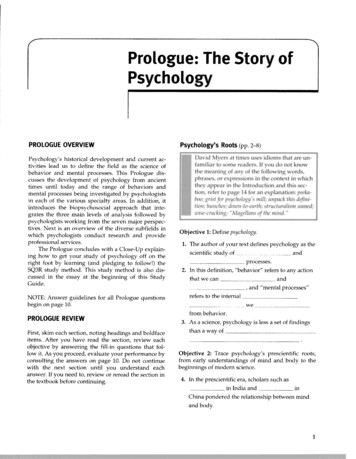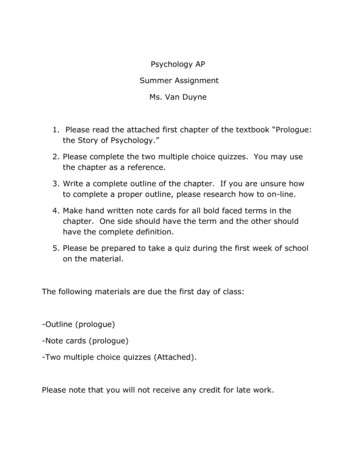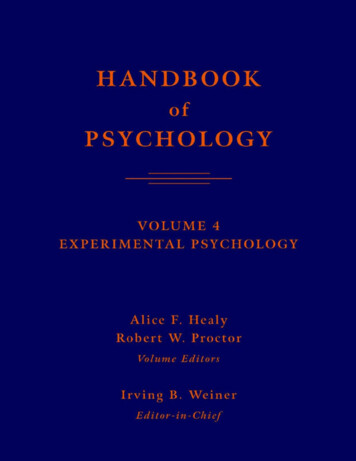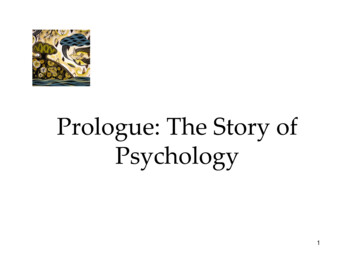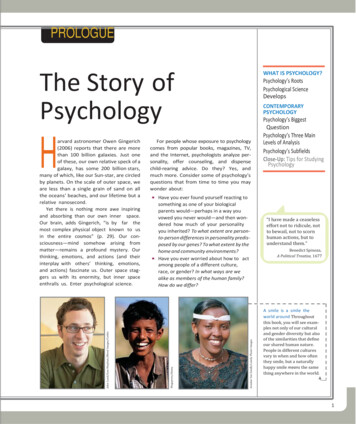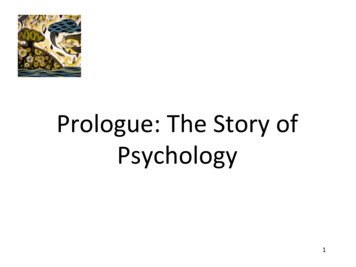
Transcription
ALBERT R. MANNLIBRARYNew YorkState CollegesOFAgriculture and'., Home EconomksCornell University
Cornell University LibraryHF 5438.E25Psychology of salesmanship.3 1924 013 823 178
B9ThetineCornell UniversityLibraryoriginal oftliisbookis inCornell University Library.There are no known copyrightrestrictions inthe United States on the use of 23178
PSYCHOLOGY— OF —SALESMANSHIPBYGEO.R.EASTMAN,A.B.,A. M.TEACHER IN STEELE HIGH SCHOOLSECRETARY OF THE REX FILM RENOVATOR MFG.CO.AUTHOR OFPSYCHOLOGY OF BUSINESS EFFICIENCYPSYCHOLOGY OF ADVERTISING(IN" The master of thePREPARATION)art of sellingisthe masterof men—Psycholoffy of SalesmanshipTHE SERVICE PUBLISHING COMPANYIDAYTON, OHIOi-.L.
COPYRIGHT,GEO.1916— BY—R. EASTMAN6
CONTENTSFOREWORDSelling the Contents to the ReaderPage7INTRODUCTIONSalesman Performs an Economic FunctionPractical Knowledge and SkillSalesmanship Is Applied PsychologyPART101115IMaking the SalePreparation of Salesman and of Selling PlanParts of the Selling ProcessPre-Approach (Investigation and Preparation)Approach and Securing Attention16161925SolicitationAim of the SolicitationStating the Aim in Taking Up a New PointPutting the Main Points in WritingAdapting Solicitation to Customer's Mind31313637TruthDemonstrationArousing Irrelevant Impulses39414243454750Means51Effectiveness CumulativeBrief Solicitation FirstRenewal of the Solicitation-IllegitimateMaking Solicitation Effective52Diagnosis583
CONTENTS4Dealing with ObjectionsMaking Known the PriceFeeling Out and ClosingAfter ClosingGeneral ConsiderationsSalesmanship As a ProfessionProblems of Marketing CommoditiesPART67747586899294IIProcess op Thinking, Feeling and ActingBehaviorDistinction between Mental &nd Physical Processes.Subjective and Objective RealmsMethod of Gaining Psychological KnowledgeExperimental PsychologyKnowledge of the Minds of OthersClassification of Conscious ProcessesMind and BrainHabitAcquiring Proficiency in a New LineAssociation of Processes of Thinking, Feeling, andActingAssociation by ContiguityAssociation by SimilarityMemory and the Art of 7119123Association Processes in Education128Process of Learning129Learning Aims to Grasp the Significance of Things. 132Most Efficient Method of Learning184Interest and Attention139Voluntary and Spontaneous Attention141Focus and Margin of Attention145Expectant Attention146Attention Determines Thinking, Feeling and Acting 148Acts op Will, or Ideo-Motor Activity150Acts of Will Involving Deliberation151--
—CONTENTSThinking5153162Test of TruthJudgment and ReasoningBeliefand Action„PART164167IIIFactors Which Determine Thinking, Feeling and169Acting169Instincts or Predispositions173Enumeration of Instincts177Instincts Require Educational Development—180182Modification of InstinctsWill to LiveInstinct of Self-RealizationMoral InterestTwo Meanings of InterestClassification of InterestsMorality the Major Interest—Philanthropy InterestPolitico-Legal Interest-Family and Home InterestSociability InterestHealth InterestEducation InterestAesthetic InterestWealth InterestVocation InterestWork and the Need for RecreationRecreation InterestCorrelation and Co-ordination of InterestsInterest, Desire, Valxje and PriceTruth, the Ideal of SellingAwakening Latent NeedsArousing Desire„Suggestion and ImitationFactors of 7198199202204208212216219220223225
CONTENTS6Subconscious ImitationConscious or Intentional ImitationFully Reasoned Choice and Demonstrated TruthRational Suggestion and Rational ImitationRational SuggestionIncreasing the Efficiency of the Selling ForceConvention of SalesmenSales ContestAwakening Interest Increases EnergyDeveloping Character and PersonalitySuccess Depends upon CharacterSelf ConfidencePersonal Magnetism231234239241242250251252253256256259261
FOREWORDSELLING THE CONTENTS OF THIS BOOK TO THESALESMAN WHO IS CONSIDERING WHETHERHE WILL BE REPAID FOR THE EFFORTREQUIRED TO MASTER IT.This book is intended for the person who is convinced that salesmanship is an honorable profession,rendering an important and difficult service. It isfor those who have awakened to the fact that thesalesman is not born ready made, with his powersfully developed.The salesman must be made, in large part at least,by serious study. The efficient salesman must knowthe workings of, and have skill in influencing complicated and intangible mental processes, whichdetermine the behaviour of men. It takes persistenthard work to gain an understanding of the factorsand processes which determine the actions of men.The salesman's efficiency will vary directly with thisunderstanding.The scientific farmer, the teacher, the accountant,the lawyer, the engineer, the architect, the physi-and many others, have found itworth their while to make a serious and carefulcian, the minister,wellpreparation for the practice of their profession.The salesmanwill at lastcometo realize that intelli-
8PSYCHOLOGY OF SALESMANSHIPgent preparation for his work is quite as important,jand will bring equally great reward.The salesman can determine whether he is fullyprepared for the practice of his profession by askinghimself a few questions, and grading himself on hisanswer them.ability tosalesmanship? What does the approachaim to accomplish? What are the laws which governthe direction of attention to a thing, when it hasonce been secured? How is attention related to interest? What interests does the normal man have?Do you know to what interests your selling appealshould be directed? What is the relation betweeninterest and desire? How would you undertake toarouse desire? When you have aroused desire, doyou know how to carry it over into action? Howcan you tell when you have reached the "psychological moment" for attempting to close?How can aman think ahead and plan what he will say next,while his attention is adequately given to what he issaying? What are the best methods of learning;remembering, and thinking?This book aims to give the salesman scientificknowledge which will enable him to answer satisfactorily the foregoing, and many other similarWhatisconsistent.knowledge is thorough andMethods guided by such knowledge areeflScientaccomplishing the desired result.questions.inScientificAknowledge of mental processes enables thesalesman to work intelligently and directly towardscientific
SELLING CONTENTS TO SALESMEN9the end he wishes to achieve, instead of resorting tothe aimless and wasteful try, try again of thewhose knowledgeismannot equal to the demands of thesituation.The salesman ought notdemnto be discouraged, or con-this book, if he does not at once grasp the fullsignificance or practical helpfulness ofall itcon-Twoor more thoughtful readings may betains.required to enable one to get the psychological pointof view and master the method of the science. Onehas not mastered this discussion in a way that willmakeit of the greatest practical helpfulness until heunderstands clearly all the parts, and perceives theirrelations to each other and to the whole. He mustlearn to reassemble and to put to working harmoniously together the various processes that are hereknocked down and taken apart for purposes of study.The writer has tried long and earnestly to makethis book elementary and practical. He is convincedthat he could make it simpler only at the expense ofmaking it more superficial. This would defeat theend aimed at in preparing it. The difficulty encountered in understanding and applying what is writtenhere results mainly from the intangible nature ofthe subject matter and the lack of skill in exploringone's own mental processes. As one becomes skilledin the exploration of his own mind, the practical usefulness of the principles discussed here will becomeapparent.
INTRODUCTIONSALESMAN PERFORMS AN ECONOMIC FUNCTIONthe world of business the sal AS AmanFACTORa mutuallyconcerned withineffectingisadvantageous exchange, in which money, or someother means of securing satisfaction, or some formof satisfaction, is received in return for the service,As the salesman peror serviceable thing sold.forms an important business function, he shouldhave some knowledge of business affairs.The salesman must be master of his merchandise.He should have adequate knowledge of the materials, and mechanical and industrial processes employed in making the articles he sells.He mustclearly perceivewhat the process of manufactureit qualities whichconfers on the article, in giving tomakehave a commercial value superior to otherthings with which it may come into competition. Itis generally recognized that it is important for thesalesman to have knowledge of these things whichmay be called the material factors in salesmanship.A man may be well informed in regard to thethings previously mentioned and still be very poorlyequipped in salesmanship. Additional factors whichmake for success, are knowledge of what to do Inattempting to sell, and why it is done also skill init;10
INTRODUCTION11it.Skill may be developed best by practice inwhich one's efforts are guided by knowledge of the"what" and the "why." It is the purpose of thisbook to help to give a knowledge of the what to do,and why to do it.doingPRACTICAL KNOWLEDGE AND SKILLmay be acquired by blind imitamethods of selling and by more or lesshaphazard methods of trial and error. The methodsthat fail are rejected and the methods that succeedare adopted, without knowing why they fail orThe art ofsellingtion of other'ssucceed.By this process one may gain considerable knowledge of what to do and may become skillful in doingit.But he will be able to apply this knowledge andskill only under the conditions in which he learnedThey are not readily transferableto apply them.and adaptable to a different situation.Knowledge and skill acquired by the method ofblind trial and error afford satisfactory guidanceonly in cases easily recognized as similar to those inwhich success has been achieved previously. Onewho has learned by this method will not be able toperceive the circumstances which alter cases. Evenif he perceived them, he could adapt his knowledgeand skill to the requirements of the altered circumstances, only by continuing the process of selectingthe lucky hits from the misses.Such a process of acquiring knowledge and skill
PSYCHOLOGY OF SALESMANSHIP12whenlacks the guiding light of intelligence. Evenhemethodthisone has gained practical success bydoes notknow why one attempt succeeded andtheother failed.One who has previously acquired the knowledgewhich enables him to understand the whys andwherefores of success will be able to go intelligentlj about the task of finding the right course of proced*ure under novel circumstances. If one has this kindof knowledge, when it occurs to him to try variouslines of effort, he will be able to forecast more or lessaccurately the consequences of each line of action.Hewillthus beabletoavoidmuchwastefulbungling.The Theory of Salesmanship endeavors to bringinto clear consciousness a knowledge of the whatsand the hows, the whys and the wherefores of theIt aims to formulate general princiand to organize them into a system so that theyhave the greatest practical usefulness in selling.art of selling.pleswillItaims, not at a theory divorcedat a system of general principlesfrom practice, butwhich will furnishhelpful guidance to the various practical activitiesof the salesman.In this book the process of sellingalyzed.Atheory of salesmanshipiscarefully an-isdeveloped sothat the salesman can see the general principleswhich are to be applied in efficient selling. Thesalesman will master his art more quickly and will
PRACTICAL KNOWLEDGE AND SKILLbecome more expertinit13by learning and applyingthese general principles.which enable one to do athing have a certain value. But unless one knowsThe knowledge andwhy hehisskilldoes the thing that way, he can not adaptskill to altered conditions whichnecessary to change the way of doing theknowledge andmakeitHe can not adapt his knowledge and skill todoing other things.One who knows why he does a thing in the way hedoes, and sees that the doing is a particular application of general principles, can do many other thingswhich come under the same general principles. Athing.knowledge of the general principles of selling makesone resourceful and adaptable.The salesman who understands the general principles of salesmanship can instruct and direct othersin selling. He has the sort of knowledge which helpsthe salesman to develop into a salesmanager.SALESMANSHIPISAPPLIED PSYCHOLOGYWhy is it profitable for the salesman to studypsychology? Salesmanship is an art. Though thesalesman performs an economic function, the principles of his art are psychological. In the act ofselling, the salesman deals directly with mental processes.Salesmanship is, essentially, applied general, individual,andsocial psychology.Salesmanship is the ability to influence the mentalprocesses of a person so that he will desire the serv-
PSYCHOLOGY OF SALESMANSHIP14or the serviceable thing, offered to him and willperform the acts necessary to secure it. The art ofselling involves applying to a special line of activity,under the conditions which govern there, the generalice,which must be applied in any case inperson seeks to influence the behaviouronewhichprinciplesof another.The art of salesmanship involves understandingand skill in influencing the mental processeswhich are the factors that determine the behaviour,or the actions, of the men with whom the salesmanThe salesman must discover what interestsdeals.of,of his prospective customers are concerned withwhat he intendssatisfy ?Whattosell.Whatneedsis it fltted toqualities of the thing to be soldfit itto satisfy these needs or interests ?The salesman must secure the attention ofmantowhomhe wishes tosell.Bypresentingthesuit-form of arguments or sugthe salesman must influence the mentalable selling points, in thegestions,processes of his customer so that he arouses a desirefor the article and a conviction that the purchaseshould be made. He must not only see that the customer arrives at a favorable decision he must alsosee that he definitely commits himself to the pur;chase.Argument, suggestion, attention, interest, deand decision are mental processes.To clearly understand them one must study othersire, conviction,
SalesmanshipisApplied Psychology15mental processes such as habit, memory, association,and thinking.It must now be clear that in the act of selling thesalesman is dealing directly with mental processes.The science which gives an understanding of mentalprocesses is psychology.The salesman needs toknow psychology in order that he may intelligentlyundertake to influence the mental processes and,through them, the actions of men. The master ofthe art of selling is the master of men. The salesman needs to know psychology as a means to the intelligent direction of hisThe generalownlife.principles of the art of selling willbe developed in Part I. This discussion will enableone to see what psychological processes are involvedin selling, and how they are to be dealt with by thesalesman. Parts II and III will give a clear understanding of the psychological processes with whichthe salesman has to deal. By means of illustrativeexamples, it will be made clear how a knowledge ofthese psychological processes will help to make oneproficient in understanding and applying the general principles of salesmanship developed in Part I.It is obvious that much light should be thrown onPart I by reading it again, after Parts II and IIIhave been mastered.
PART IMAKING THE SALEPREPARATION OF THE SALESMAN AND OF THESELLING PLANThis book aims to develop the general principleswhich underlie the art of selling. Special study isrequired to apply these principles in any special lineof selling. Skill in the practice of the art must comefrom special study and carefully and intelligentlydirected practice.The things one must do, in order to prepare to sellsome particular thing, will vary considerably withthe thing.A detailed discussion of them would hardly be inorder in a book which undertakes merely to developand illustrate the practical application of psychological principles.It would be excluded on the groundthat a work on general principles must not confineitself too closely to any particular line of selling.One who understands the principles should be able,by putting forth the necessary effort, to apply themtoanyspecial line.PARTS OF THE SELLING PROCESSIn the complete selling process there is first of allthe pre-approach. In the pre-approach one studies16
PREPARATION OF SALESMAN17the special needs and individual characteristics ofhis customer.[In this discussion thedenote the man toStrictly speaking, heterm customeriswhom one is tryingmay be no more thanused totosell.a pros-Yet it is well to treat every manhe were a valued customer. The aimshould not be merely to make a sale, but to make acustomer. The sincere manifestation of this attitude has a suggestive force tending strongly towardmaking both the sale and the customer. The salesman, who has this attitude, will think of each mansolicited as a customer.It will do no harm to callhim so in our discussion.]On the basis of the information gained, he formulates a proposition adapted to the customer's needs,and plans his approach and solicitation to close thecircuit with the customer's interest.After thispreparation has been made, the salesman undertakesthe actual approach, in which he aims to secure attention to his proposition and an opportunity topective customer.solicited as ifpresentit.If he is successful in his approach, he proceedswith themaysolicitation.display samples orDuringthis solicitationmake a demonstrationheof thearticle. The solicitation aims to stimulate desire forthe article and to arouse an impulse to purchase it.As the salesman goes on with the solicitation hemust dispose of any objections the customer mayraise.He must skillfully diagnose the impressionhe is making on the customer's mind. He must feel
18PSYCHOLOGY OF SALESMANSHIPout the customer to see when he has reached theproper time to attempt to close. When the time isripe, he must undertake to bring about the performance of the particular acts which the customer mustperform in order to close the sale.
PRE-APPROACHIn selling a low-priced specialty, or article of gendemand there may be little opportunity, or littleneed for the pre-approach.The nature of the pre-approach may be made cleareralby the methods worked out forselling National CashThis pre-approach is divided into twoprocesses, the investigation and the preparation.The salesman is first instructed to make a note ofthings favorable to the success of the prospect'sbusiness.Among them are good goods, properlighting, efficient clerks, desirable class of cus-Registers.tomers,etc.The salesman should next investigate the methodof doing business. He should find out the ways inwhich losses may occur. He may do this by observation, by conversation with the clerks, or even withthe proprietor. To get the desired information fromthe proprietoritmay benecessary to convince himof the importance of discussing his business withIn exceptional cases, by making apurchase, the salesman may secure information ofmuch importance, which he could not get otherwise.The investigation aims to give the salesman factswhich will enable him to interest the merchant andshow him why he can not afford to be without an upto-date National Cash Register.If the store is small, the preparation can be madethe salesman.19
PSYCHOLOGY OF SALESMANSHIP20mentally, while the salesman is investigating. Theinvestigation, the preparation, and the approach canallbe made at the samevisit.salesman should leave theand prepare a writteninvestigationstore after histhis written anlargeststoresFor theanalysis.If the store is large, themaybe included in a written proposition.This proposition will give an explanation of thesystem proposed for installation, the location of thealysisregisters, etc.The written analysis should list the good thingsfound in the merchant's place of business. If thesalesman unwittingly makes it appear to themerchant that he can see only bad things in theplace and method of business, he puts the merchantin an antagonistic frame of mind. By recognizingand presenting the factors favorable to the success of the business, the salesman creates in thecustomer's mind an attitude which predisposes himto consider favorably the proposition presented tohim.The analysis should point out clearly how the system in use may be improved. It should show howthe merchant lacks protection in the handling of hismoney, how he lacks sufficient information aboutmoney, and why slow service exists.hisThe analysis should also give the cost of the proposed system. It may be well to compare the pricewith the cost of the system in use, or of some othersystem under consideration for adoption.The written analysis, or proposition, may be used
PRE-APPROACH21approaching the merchant to secure an appointment for a demonstration of the register. It shouldbe thoroughly explained, and then turned over tothe merchant and left with him.The aim in the pre-approach is to enable the salesman to determine on a proposition, and formulatea plan of approach and solicitation. It enables himto present a proposition of such a sort, and in such away, that the serviceability of what he proposes toinclose the circuit with the customer's interestand needs. One can do this only as he understandsthe likes and dislikes of the customer, his point ofview, his aims and ambitions, his financial re-sell willsourses, the requirements of his business, etc.With such information at his command, the salesthe aim of his appeal as definite asman may makeWithout suchpreparation the salesman must feel out the man heis soliciting by presenting more or less aimlessly anumber of propositions and noting how they are received.His actions may be compared to a manshooting in the dark with a blunderbuss. With sucha weapon it is more or less a matter of chance ifany one of the missiles hits a vital point. When theprojectile does strike the mark, it does not havemuch force, or penetration, or effectiveness.The blunderbuss salesman reveals the fact that heis not master of his business.His random effortsmake a bad impression which it is difficult to overcome.Various firms employ persons other than salesthat of a rifleman shooting at a mark.
22PSYCHOLOGY OF SALESMANSHIPthe investigation of the pre-approach.Edison Company does so in planningservice to displace that of private plants.makementoTheNew Yorkto sell itsA technically trainedengineer makes a study of theplant to be displaced, as a basis for showing the advantage of using the central service. The data hegathers is then turned over to the salesman, whoprepares it for use in the approach and solicitation.This plan is adopted because the engineer, as a result of his technical training, can do the investigating more efficiently than the salesman. Thesalesman can make better use of the engineer's datain the actual work of selling.Some firms employ men, who work more cheaplythan the expert salesman, to make the preliminaryinvestigation, and locate prospects with whom it isdesirable for the salesman to spend his time, andto furnish him with data to use in planning his proposition, approach, and appropriate solicitation. Theproblem as to whether the salesman, or some oneelse, is to make the pre-approach is a problem ofmarketing rather than of the psychology of sales-manship.The pre-approach aims to adapt the general proposition to the needs and characteristics of the individual customer. It endeavors to gather data whichwill enable the salesman to formulate a propositionwhich will meet the real needs of the man to whomit is to be presented.It enables him to plan intelligently how to close the circuit with the customer'sinterests.
PRE-APPROACHSometimes aneffort ismadeto23prepare theman tothat he will be favorably disposed toward the proposition of the salesman. Advertise-besolicited, soments in periodicals, and papers,ters can thus be used to paveapproach and solicitation. Theof advertising and salesmanshipin such an endeavor.circulars,thewayandlet-for thegeneral principlesmust be employed
APPROACH AND SECURINGATTENTIONIn his approach, the salesman aims to secure anopportunity to present his selling proposition to aprospective customer.correct approach means more than merely inducing a man to notice that you wish to sell himsomething.It involves getting him to lay asideother matters with which he may be occupied andto concentrate his thoughts on the proposition.AThe approachis gi-eatly facilitatedby aprosper-ousappearance, attractive personality, pleasantand courteous manners. What the salesmansays and does should suggest that he has a forcefulcharacter, ability, assured and important positionin the business world, geniality, humor, etc.Histactics should be based on a general understandingof human nature, and such knowledge of the customer as he could secure from others, or acquire byvoice,direct observation.Every one is inclined to be inspired by a man whoknows his proposition thoroughly, believes in it enand earnestly wishes others to knowabout it and to be benefited by it. If a salesmanmeets these requirements, he will have little difficulty in securing and holding the attention of menwith whom it is worth while to spend his time,thusiastically,24
APPROACH25Let us first consider the wrong way of going aboutDo not ask attention, as a favor, or say thatyou would like to secure attention for a little while.Never say "I wish to interest you in my proposiWhenever the words "my proposition" aretion."used they suggest that the salesman wishes to securethe attention for his own benefit. The salesman always should suggest that he is endeavoring to render a service to the customer. He will do this bymanifesting a sincere belief in the serviceability ofwhat he is endeavoring to sell.Do not ask for attention. Attract it. Attentionmust not be attracted to the salesman, or by thesalesman. Attention must be attracted to the selling proposition and by the selling proposition, if itis secured effectively.If the salesman can secure attention to a request for attention, he can secure attention to a statement or question about the proposition, aimed to arouse interest.In dealing with business men, the salesman shouldnever resort to cheap trickery indulged in by somecanvassers, in order to gain admission to houses.The introductory statement of the approachshould be worked out as carefully as the heading ofan advertisement. It performs a very similar function to that of the heading.It should make somestatement about the proposition which will arouseinterest in it and make it seem important enoughto demand a thorough investigation. The best wayto arouse interest in a proposition is to state definitely and clearly, but briefly, in what way the acit.
PSYCHOLOGY OF SALESMANSHIP26ceptance of the proposition will be of advantage tothe customer. Awaken a foretaste of the satisfaction he will secure by making the purchase. Put theemphasis on the service the article will render. Ifnecessary, support this with brief arguments orlustrationsmakingcleartheShow why he can notservice.investigate.Keepinil-importance of theafford to refuse toyour customer's mind whatyour proposition will contribute to the realizationof his interests, if you can make your claims good.You can thus get him interested in seeing how andwhy the thing will do what you claim for it. A goodapproach will pass over naturally, and almost imperceptibly, into the solicitation.salesman represents a business noted forits products or merchandise, andfor the efficiency of its selling force, he may attachIf thethe excellence ofsome ofthis valuable prestige to himself, by bringing out clearly in introducing himself, that he is arepresentative of that business.In his approach, a salesman of investment securi-put emphasis on the large and certaindividends, the safety and convertibility of the inties could welletc.The salesman of merchandise coulddwell on the timeliness, style, quality, and price,which will make them sell rapidly and bring in largevestment,profit.The certainty of good business conditionsinthe near future will predispose a man to considerbuying.When interest is aroused, the salesmanshould then present an article which he believes of-
APPROACHfers a very attractive bargain,clear its attractive features.27and proceedtomakeIf the conditions of selling are such that it is necessary to make an appointment to go with the manto some other place to see samples, or the demonstration of the article, it may be well for the salesmanto beon hand at the appointed timetoaccompanyhim.If a man meets the approach with the statementthat he does not need the article, have ready an argument to show why he should reserve his decisionhas investigated. If he says he is notit clear that you do not expect himto be interested until he appreciates the service theproposition will render him. The plea may be thathe has no time to look into the matter. Remind himthat the salesman's time is valuable to himself andhis firm.The salesman could not afford to taketime to talk to him unless he felt certain he had aproposition that would appeal to him as a businessman.If the customer is ill-natured, or in an antagonistic mood, make him forget it by talking about somesubject he is interested in, outside your line of business. If you can not succeed in this arrange to calluntil after heinterested,makeagain.Approach a man, if possible, when his energiesare fresh, and his mind is free. If he is so occupiedthat he can not give you his full attention, make anappointment for a more favorable time
PSYCHOLOGY —OF— SALESMANSHIP BY GEO.R.EASTMAN,A.B.,A.M. TEACHERINSTEELEHIGHSCHOOL SECRETARYOFTHEREXFILMREN

